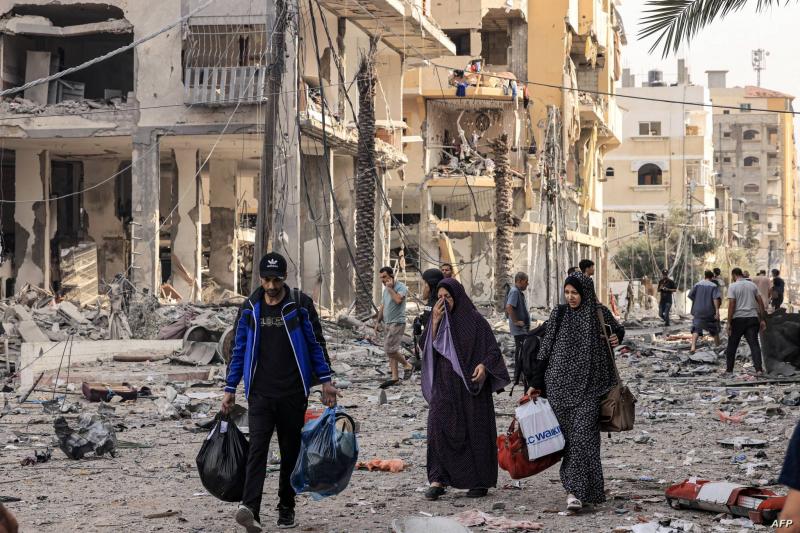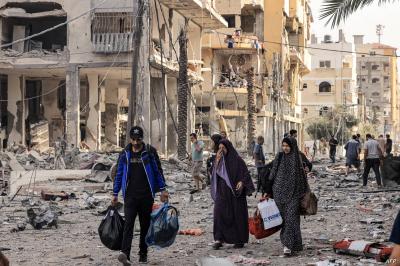The calls for establishing a humanitarian corridor or escape route for Palestinians from Gaza, alongside the escalating conflict between Israel and the Islamic Resistance Movement (Hamas), have sparked strong reactions from neighboring Arab countries. Egypt, the only Arab nation with a shared border with Gaza, and Jordan, adjacent to the Israeli-occupied West Bank, warned against forcing Palestinians to leave their lands. This reflects deep-rooted Arab fears that the ongoing war between Israel and Hamas in Gaza could lead to a new wave of permanent displacement from the territories where Palestinians aspire to build their future state.
Egyptian President Abdel Fattah el-Sisi stated on Thursday, "This is the issue of issues and the matter of all Arabs." He added, "It is important for the Palestinian people to remain steadfast and present on their land." For Palestinians, the idea of leaving or being forced out of the land they seek to establish their state on resonates with the echoes of the "Nakba," when many Palestinians fled their homes during the 1948 war that accompanied the founding of Israel. Approximately 700,000 Palestinians, or half of the Arab population in then British-ruled Palestine, fled or were expelled from their homes, with many being displaced to neighboring Arab countries where they or many of their descendants still reside. Many remain in refugee camps.
Israel denies the reality that it expelled Palestinians, arguing it was attacked by five Arab countries the day after its establishment. Since launching its intensive bombardment of Gaza following the sweeping attack by Hamas militants on October 7, hundreds of thousands of Gaza's 2.3 million residents have fled their homes but remain within the territory.
To prevent the crisis from escalating, the Israeli army warned civilians in Gaza City, whose population exceeds one million, to move south within 24 hours for their safety, signaling that Israel may soon launch a ground invasion. In response, Jordan's King Abdullah II warned against any attempt to displace Palestinians from all Palestinian territories or cause their displacement, emphasizing that the crisis should not be transferred to neighboring countries, exacerbating the refugee issue.
Ahmad Abul Gheit, the Secretary-General of the Arab League, urgently appealed to UN Secretary-General Antonio Guterres to condemn this Israeli "irrational" attempt to transfer populations. The United States stated this week that it is having discussions with Israel and Egypt regarding the idea of a safe corridor for civilians from Gaza. UN spokesperson Stéphane Dujarric remarked, "Civilians need protection. We do not want to see mass displacement of Gaza's population."
Israeli UN envoy Gilad Erdan stated that the evacuation warning aims to "temporarily move (people) south to mitigate harm to civilians." This was said during an event at the UN with families of Israelis abducted by Hamas. Erdan told UN diplomats at the event hosted by Israel, "The UN should commend Israel for taking these precautionary measures." He added, "For years, the UN has had its head in the sand in the face of Hamas's terrorism buildup in Gaza."
The fate of Palestinian refugees is one of the thorny issues in the faltering peace process. Palestinians and Arab countries insist that any agreement must include the right of these refugees and their descendants to return, a demand that Israel consistently rejects. In Khan Younis, southern Gaza, Maryam Al-Fara, a 36-year-old mother of two, said that those displaced within the sector are crowded without water, electricity, or internet connections. She added, "People just say that we will all go to Sinai, and that we will be forcibly displaced. We have nothing to do with any of this. We just want to live in peace."
Some Israeli statements have raised Arab concerns. An Israeli military spokesperson suggested on Tuesday that Palestinians "exit" through the Rafah border crossing at Gaza's southern border with Egypt, though the Israeli army clarified that the crossing was closed at that time. The Rafah crossing is the main gateway between Gaza's residents and the outside world, while all other crossings lead to Israel.
Since Hamas took control of Gaza in 2007, Egypt has helped maintain the blockade of the territory, largely closing its borders and imposing strict controls on the passage of goods and people through Rafah. Egypt has faced an Islamist insurgency in northern Sinai that peaked after 2013 before security forces regained control. Security sources and analysts say Egypt seeks to prevent armed infiltration from Hamas, which shares its ideology with the Muslim Brotherhood, a banned group in Egypt.
Egypt states that the Rafah crossing is open and that it is working to ensure humanitarian aid delivery to Gaza, though Israeli bombardments near the border hinder this effort. Cairo has also indicated that any resolution of the issue through mass displacement of Palestinians is unacceptable.
The opposition to new displacement of Palestinians is deeply rooted in Egypt. The peace treaty with Israel, signed over four decades ago, included an Israeli withdrawal from the Sinai Peninsula but never resulted in reconciliation at the popular level. H.A. Hillel, a fellow at the Royal United Services Institute, remarked that the Egyptian public would overwhelmingly view this as a precursor to ethnic cleansing, forced displacement, and essentially expulsion, expecting that they would never return.
The conflict over Gaza has also raised long-standing concerns in Jordan, home to a large number of Palestinian refugees and their descendants, that the outbreak of a broader conflict could provide Israelis with the opportunity to implement policies for the collective expulsion of Palestinians from the West Bank. After an emergency Arab League meeting on Wednesday, Jordan's Foreign Minister Ayman Safadi stated that all Arab countries agreed to confront any attempts to displace Palestinians from their homeland.




